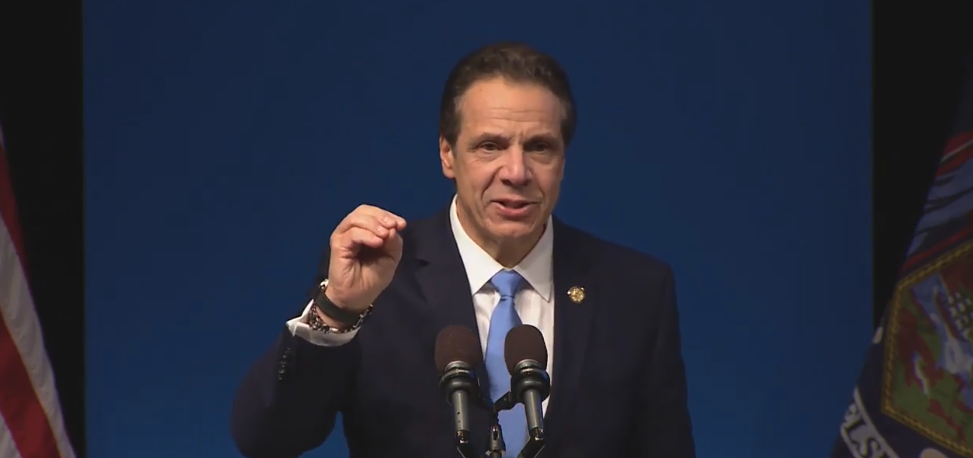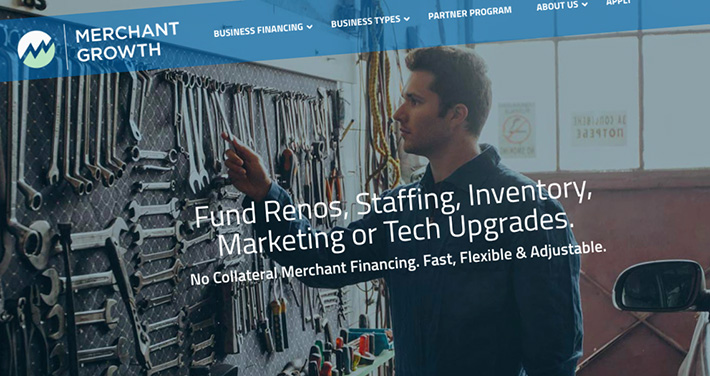CAN Capital Hired a New CFO: Here’s His Take On The Company
July 23, 2019 The last 12 months have seen plenty of developments within the offices of CAN Capital. September witnessed the announcement of a new credit facility of $287 million with Varadero Capital. January brought news of the hiring of a new CEO. And now, completing the hat trick is CAN’s employment of John McNeill as its CFO.
The last 12 months have seen plenty of developments within the offices of CAN Capital. September witnessed the announcement of a new credit facility of $287 million with Varadero Capital. January brought news of the hiring of a new CEO. And now, completing the hat trick is CAN’s employment of John McNeill as its CFO.
Coming from years of experience in finance, with firms such as Ocwen Financial and Zume, McNeill is stepping into his role with an optimism normally reserved for those at the offset of a new business. Saying that due to recent restructuring, new hirings, and CAN’s re-evaluation of its position in the market over the previous two years, McNeill believes that the company “feels like it’s a nimble startup.” Albeit a startup that has been in the industry for over 20 years.
Founded in 1998 by a small business owner who struggled to be approved for a business loan, CAN has been cemented as a legacy figure within the alternative finance industry. Having persevered through the ’08 crash as well as other economic hiccups over the past two decades, CAN is uniquely positioned in that it has 20 years worth of experience and data, not to mention the personnel who have stuck around to become veterans as well, to guide them through the current moment of market saturation.
And it is the synergy between these two aspects of CAN, the new and the old, that initially drew McNeill to the company. The opportunity to work alongside people who have decades of experience in the market, as well as those who have only been there a few months longer than himself, led McNeill to view CAN as an anomaly, where it’s “like being the new guy, but with all of the tools of historical experience.”
This freshness tempered by lessons learned in the past is also attributed by McNeill to CAN’s CEO, Edward J. Siciliano, who’s worked in commercial financing, sales, marketing, and operations for over 30 years; and who has aimed to expand operations, both technologically and geographically, since his taking up of the role.
McNeill believes that there continues to be plenty of the market left to expand into, saying there’s “still a lot of opportunities to make money and to help secure funding for businesses across America.”
Is The COJ Law In Effect Yet?
July 18, 2019
The COJ bill passed, but where’s the governor’s signature?
When the legislature passes a bill in New York State, there’s a documented procedure on the Senate’s website for how it becomes law. If the legislature is still in session, the governor has only 10 days to sign it. If the passed bill is sent to the governor when the legislature is out of session, the governor has 30 days to sign it.
Caught in this process is S6395, the now-infamous COJ bill that prohibits the filing of a COJ in New York State against a non-New York resident. Its passage on the 18th of June and the closing of the legislative session theoretically put the bill on the 30-day track for the governor’s signature.
Indeed, the Farm Laborers Fair Labor Practices Act, which was debated on the Senate floor for several hours during the closing few days, has already been signed. So too have other bills, but not the COJ bill whose deadline for a signature was perceived to be around now.
But such deadlines are a bit more fluid in practice, legislative insiders say. The act of “delivering” the bill to the governor is a step all on its own and the legislature can actually withhold its formal delivery to avoid setting the clock in motion.
According to an official who’s familiar with the process, it could be months before the dotted line is signed. The official, who asked not to be named, explained that upon the bill being delivered to the governor’s office, only then will Governor Andrew Cuomo have 10 days to sign it. The legislature can also technically withhold delivery up until the very end of the year. This, the official explained, is done to ensure that legislation is thoroughly vetted, with extra checks to guarantee that bills are not unconstitutional and that they’ll lead to no previously unforeseen consequences.
Cuomo has already signed a bill allowing Congress to access Trump’s state tax returns, a bill raising the tobacco & e-cig buying age to 21, a bill guaranteeing women equal pay, and many more. All of which means the COJ bill could be next at any moment or it could be sentenced to signature purgatory until the last business day of 2019.
As the public waits with bated breath, small business finance companies are already planning next steps. Ian Nadjari, the Managing Director of Riverstrong Capital Funding, who said that his office was “not feeling good about [the bill],” is planning to drop their use of COJs entirely and update the terms of their future contracts. Nadjari aims to continue business regardless of the impending changes, he said.
Uplyft Capital CEO Michael Massa, explained that the bill is just a “change that we’ll have to adapt to. Certain players will be okay if they understand how COJs work.”
Several small business funding CEOs explained to deBanked that they welcome S6395 with the belief that it will level the playing field. One asserted that it will “eliminate some of the bad practices in the market,” such as the “offensive, aggressive measures” taken by firms who filed COJs too quickly or potentially in bad faith.
That perception, that such practices are not only possible, but have occurred, has garnered attention far beyond New York State. On June 26, for example, several members of Congress held a hearing to discuss COJs and their impact to further support for a federal bill that would ban them from use nationwide. That bill has a quite a bit a ways to go before it ever potentially even comes up for a floor vote.
Star Fundraiser For 1 Global Capital Settles With The SEC
July 15, 2019 Henry J. “Trae” Wieniewitz, III was charged by the SEC on Monday for his role in allegedly selling unregistered securities in two companies, 1 Global Capital (the now defunct merchant cash advance provider) and Woodbridge Group of Companies (a purported real estate lending business revealed to be a $1.2 billion ponzi scheme).
Henry J. “Trae” Wieniewitz, III was charged by the SEC on Monday for his role in allegedly selling unregistered securities in two companies, 1 Global Capital (the now defunct merchant cash advance provider) and Woodbridge Group of Companies (a purported real estate lending business revealed to be a $1.2 billion ponzi scheme).
“Wieniewitz and Wieniewitz Financial raised more than $11.4 million and reaped approximately $500,000 in commissions from unlawful sales of Woodbridge securities, and raised more than $53 million and obtained approximately $3 million in commissions from unlawful sales of 1 Global securities,” the SEC stated.
Wieniewitz was not a registered broker-dealer nor associated with a registered broker-dealer.
A settlement was announced simultaneously. “Wieniewitz and Wieniewitz Financial settled the SEC’s charges as to liability without admitting or denying the allegations, and agreed to be subject to injunctions, with the court to determine the amounts of disgorgement, interest, and penalties at a later date,” an SEC statement said.
Wieniewitz was not alone in selling investments in both 1 Global and Woodbridge.
Separately, the owner of Woodbridge and two former directors of the company were recently charged criminally.
No criminal charges have been brought to date in the 1 Global Capital saga. That could change. 1 Global Capital revealed in 2018 that it was being investigated by the US Attorney’s office. That along with the SEC investigation prompted the company to file for bankruptcy. The SEC subsequently brought civil charges.
Documents filed in the SEC case against 1 Global’s former owner, Carl Ruderman, have since revealed that at least one former employee had been approached by the FBI about the operations of 1 Global.
Last month, it appeared Ruderman and the SEC were heading towards a settlement.
One notable fact about 1 Global Capital is that the company participated in the largest merchant cash advance in history at $40 million. That transaction has become a point of significant controversy and litigation. The recipient of those funds, a conglomerate of car dealerships in California, have shut their doors.
Online Lenders Beat Credit Unions, Friends, and Family as Primary Source of Credit
July 14, 20197% of small businesses generating less than $5 million/year in revenue relied on online lenders as their primary source of credit in the last quarter, according to the latest Private Capital Access Index published by Pepperdine Graziado Business School. 3% relied on credit unions as their primary source and 6% relied on friends and family.
Banks were the most popular. 19% relied on large banks as their primary source of credit and 12% relied on community banks.
38% said they didn’t have any source of credit at all.
Sticking with the under $5 million/year segment, 45% of respondents explained that their primary source of credit had become so simply because they were able to qualify for it. 21% said their primary source became so because they couldn’t qualify for any other source.
Meanwhile, merchant cash advances, online business loans, and factors experienced among the lowest reported approval rates for businesses of all sizes. Of those businesses that applied for financing, the success rate in obtaining funds are as follows:
| Financing Type | Success Rate |
| Business credit card | 65% |
| Trade credit | 57% |
| Personal loan | 51% |
| Lease | 48% |
| Bank loan | 41% |
| Online lender | 38% |
| Merchant cash advance | 31% |
| Asset Based Lender | 28% |
| Factor | 23% |
| CDFI/Credit Union | 18% |
While bank loans came in at 41%, revenue was a major determining factor. 88.9% of businesses doing $5 million to $100 million/year in revenue successfully obtained a bank loan while only 31.6% of businesses doing less than $5 million/year in revenue successfully obtained a bank loan.
Confession of Judgment Bill Still Awaits Governor’s Signature
July 9, 2019 New York State Governor Andrew Cuomo will have only ten days to sign S6395, the bill that prohibits companies from entering Confessions of Judgment in New York against non-New York State debtors, once its delivered to him. Only two possible contingencies could prevent that from happening:
New York State Governor Andrew Cuomo will have only ten days to sign S6395, the bill that prohibits companies from entering Confessions of Judgment in New York against non-New York State debtors, once its delivered to him. Only two possible contingencies could prevent that from happening:
(1) An official veto
(2) a pocket veto
Neither is expected to take place. Reining in the use of COJs was an official part of the Governor’s 2019 justice agenda.
The law only requires that a debtor reside or have a place of business in a New York county and that the judgment only be filed and entered in that county. Whether the filing party is located in New York or Florida or Alaska makes no difference. For a personalized legal analysis, contact an attorney.
The law also only affects a narrow process, the entering of a COJ in New York. It does not prevent parties from filing lawsuits in New York.
As the bill requires the Governor’s signature to become law, the usage of COJs in New York has dwindled but has not disappeared. New York State court records examined by deBanked demonstrate that some companies are continuing to file COJs in New York against out-of-state debtors and that county clerks are continuing to honor them. However, a handful of debtors appear to be challenging previously entered COJs on the basis of S6395’s passage through the state legislature. It remains to be seen how fruitful such defenses might be.
In recent weeks, a number of companies in the small business finance industry have publicly announced that COJs will no longer be required going forward.
You can follow the bill’s path to the Governor’s office here.
This article has been updated to reflect that the deadline rules first require delivery to the Governor
Making it Work: CanaCap and the Case for Canada
July 5, 2019 What leads an alternative financer to establish their own business in Canada? For Evan Marmott and his partner Adam Benaroch, it was the level of opportunity that the country offered in comparison to United States, where the alternative funding industry had become bloated and saturated with funders and brokers alike by 2017, when the pair established CanaCap.
What leads an alternative financer to establish their own business in Canada? For Evan Marmott and his partner Adam Benaroch, it was the level of opportunity that the country offered in comparison to United States, where the alternative funding industry had become bloated and saturated with funders and brokers alike by 2017, when the pair established CanaCap.
Holding over 30 years of experience in alternative finance between them, Marmott and Benaroch founded CanaCap with the intention of capitalizing off interested Canadian merchants that were much more receptive to the message of brokers and funders. Not being bombarded by constant emails and advertisements for quick loans, Marmott says, leads Canadian business owners to be more open-minded to discussing alternative funding with brokers, resulting in both a better understanding of the conditions of the financing as well as more time on the phone to make deals. And on top of this, the lack of a dominant player within the alternative funding world of Canada leads to a divided market share, allowing small and large firms alike to succeed.
Accompanying this advantage of time and space within the market is the quality of merchants found in Canada. Claiming that Canadian merchants generally perform better than American business owners when repaying debts, Marmott explains that funders operating north of the border can expect to have a “cleaner” portfolio.
And lastly, the level of product knowledge amongst potential customers appeared to be just right to Marmott and Benaroch. With the former noting how CanaCap is unique in its willingness to offer second positions to Canadian businesses, Marmott highlights how his company benefits from larger financers, such as OnDeck, who many of their customers would go to first, learn about the funding process, be denied funds, and then be picked up by CanaCap after further researching the industry.
With offices in both Montreal and New York, the latter of these being for CapCall, the American counterpart to CanaCap, Marmott is well-attuned to the differences between the two markets. And while he concedes that the downside of brokering in the Great White North is the 30% that is clipped from commissions due to currency exchange, he affirms that the savings from reduced marketing costs, providing better return on investment rates, offset this loss.
Altogether, the CEO makes a convincing case for why one should consider alternative financing in Canada. Taking the tack that the country provides a fresh slate of sorts to financers, where merchants have yet to be inundated with offers, promotions, and horror stories about the industry, Marmott and Benaroch have enjoyed success with their model of approving over 90% of their applicants and streamlining the application process as to increase turnaround times.
With plans to stay put for the foreseeable future, Marmott says that he’s “looking forward to funding small businesses” as his company continues to service the entire country and the alternative finance industry in Canada develops. A plan that doesn’t sound too bad, especially with signs pointing towards increased growth and further interest from merchants.
Merchant Advance Capital Rebrands to Merchant Growth
July 3, 2019 Merchant Advance Capital, which trumpets itself as Canada’s fastest and most transparent small business financier, is rebranding as Merchant Growth.
Merchant Advance Capital, which trumpets itself as Canada’s fastest and most transparent small business financier, is rebranding as Merchant Growth.
The company has offices in Vancouver, BC and Toronto, ON and was founded in 2009.
“I founded our company out of my apartment 10 years ago,” David Gens is quoted as saying in a company announcement. Gens is the company’s president & CEO. “Back then our mission was simply to provide credit to small businesses, and we did that by providing one product, called a ‘merchant advance’. Today, we offer a comprehensive suite of financing solutions delivered with unparalleled convenience. In doing so, our mission has expanded to allowing business owners to achieve unconstrained growth, while reducing the administrative stress of running a business. As we’ve transformed our focus from one credit product to this far-reaching mission, we felt the need for our name to reflect this. We are Merchant Growth.”
Gens has been an oft-quoted source in deBanked over the years. His company closed on a $30 million debt facility last year with Comvest Credit Partners.
Gens is also speaking at deBanked CONNECT Toronto on July 25, 2019. You can register to attend at www.debankedcanada.com.






























